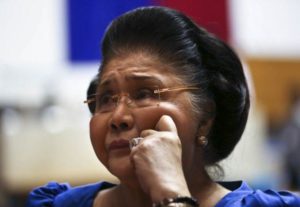Militant fishermen’s group Pambansang Lakas ng Kilusang Mamamalakaya ng Pilipinas (Pamalakaya) on Friday denounced plans to seal a deal between the Philippines and China for joint oil exploration in the West Philippine Sea, saying such a pact would be “total surrender” of Philippine territory.
The group said should the Philippines enter the deal, it would legitimize China’s nine-dash line, a highly contested historical claim of China on the South China Sea, including 80 percent of exclusive economic zone and extended continental shelf of the Philippines.
Last nail
Pamalakaya blamed China for building artificial islands intended for military buildup on the West Philippine Sea despite the 2017 ruling of the international tribunal for the Law of the Sea in favor of the Philippines that invalidated China’s claims.
Fernando Hicap, Pamalakaya national chair, said joint oil and gas exploration would be the last nail in the coffin of the Philippines’ control in the West Philippine Sea.
He said China was likely to use the joint venture as a precursor not only to completely take over Philippine waters, but also to grab its resources, including oil and gas reserves.
“By allowing China to conduct exploration in the waters it illegally occupies, the Philippine government is openly recognizing its absurd historic claim,” Hicap said in the statement.
“China has already devoured our marine resources especially in Scarborough Shoal where Chinese poachers are doing fishing expedition on a regular basis,” Hicap said.
“Now they are going to exploit our petroleum potentials in the West Philippine Sea,” he said.
“We condemn this grand puppetry and subservience to China,” he added.
Energy Secretary Alfonso Cusi on Wednesday announced that two joint oil and gas exploration deals in the West Philippine Sea awaited President Duterte’s signature.
Moratorium
The project may include China’s state-owned oil producer, China National Offshore Oil Corp.
He urged the government to lift the 2012 moratorium on oil exploration in disputed areas of South China Sea.
But Hicap said Cusi’s move was his way of giving Chinese President Xi Jinping a “warm welcome.”


